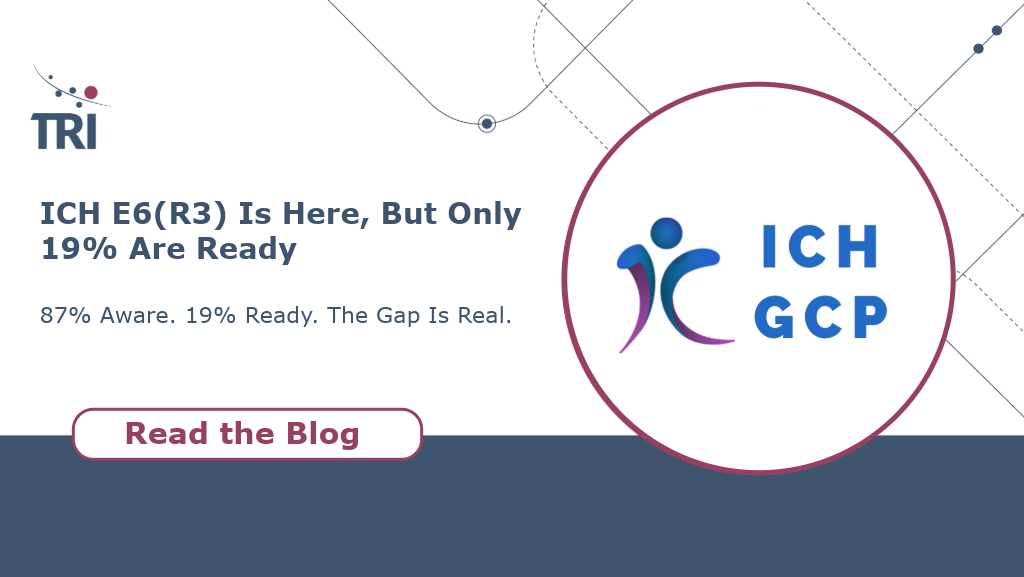ICH E6 (R3) Is Here, But Only 19% Are Ready

87% Aware. 19% Ready. The Gap Is Real.
The clinical research industry is standing at a crossroads. According to the 2025 Avoca State of the Industry Report, 87% of stakeholders are familiar with the guidance. But only 19% have taken meaningful action. What will it take to close the gap?
Risk-Based Approaches: Misunderstood and Underused
Risk-based thinking is central to ICH E6 (R3), but it’s still one of the most misunderstood areas. The guidance talks about proportionality and fitness-for-purpose in trial oversight, but a lot of teams are still unsure what that looks like day to day.
Many still see risk-based monitoring as just “doing less,” rather than a smarter, more strategic way to focus resources. And that confusion isn’t helped by the lack of practical guidance. People are asking: How do we measure proportionality? How do we validate our systems? And how do we show auditors we’re doing it right?
Clear frameworks for risk assessment are essential to answer these questions and ensure consistent, defensible decision-making.
The thinking is solid. But when it comes to knowing how to apply RBQM tools with confidence? That’s where many are still catching up. RBQM, or risk-based quality management, is more than a set of tools, it’s a mindset shift we need to align with the core principles of ICH E6 R3.
Quality by Design: High Impact, Low Adoption
Let’s talk about Quality by Design. It’s widely seen as the most impactful part of ICH E6 (R3), and I agree. When done right, it means building quality into the trial from day one. You’re focusing on what really matters and ultimately making trials smoother for everyone involved.
Avoca’s report backs this up: 39% of respondents say QbD will have the biggest positive impact on the industry, and 44% believe it can seriously reduce site burden. That’s huge.
But we’re not quite there yet. QbD isn’t fully embedded across the board. And that’s not because people don’t believe in it. Implementing QbD isn’t hard. The challenge isn’t the complexity; it’s the awareness. Many teams simply haven’t seen how seamlessly it can be integrated when you start early, define roles clearly, and align around what truly matters.
Big Promise, Bigger Barriers
The third pillar of ICH E6 (R3), outlined in Annex 1, champions the use of modern technologies and flexible trial designs to drive efficiency and inclusivity. It’s a bold step forward. But according to the 2025 Avoca State of the Industry Report, 40% of respondents say this is the hardest part to implement.
And it’s not hard to see why. Integration, validation, regulatory acceptance, and site burden are all real concerns. Sites especially are cautious, more than half of respondents believe tech adoption could increase workload for investigators and coordinators. Centralized monitoring, when implemented thoughtfully, can reduce site burden and improve data visibility without overwhelming site staff.
That’s where OPRA makes the difference. Innovation shouldn’t feel like a burden; it should feel like progress. And that only happens when implementation is done right. At TRI, we don’t just hand over the tech and walk away. Our implementation specialists are with you from start to finish, making sure your teams feel supported and in control every step of the way.
The Impact Is Real, But Uneven
Avoca’s data shows that 76% of respondents expect moderate to significant changes in how they design and run trials. Sponsors are preparing for more oversight, especially when it comes to vendor management. Sites are bracing for new documentation requirements, expanded PI responsibilities, and a steep learning curve with training.
It’s not a small shift but the upside is real. Four out of five respondents believe ICH E6 (R3) will improve trial quality. Quality by Design is expected to reduce deviations and strengthen data integrity. Risk-based approaches help teams focus where it counts, streamlining monitoring and resource allocation. A well-executed risk based approach ensures that trial oversight is both efficient and fit-for-purpose.
Why Awareness Isn’t Enough
We’re still early in the ICH E6 (R3) journey. While 63% of organisations have started making changes, most are still focused on reviewing processes. Very few have tackled the deeper shifts, such as technology adoption and team enablement.
Sponsors are feeling the pressure to lead the change, but it’s the sites that are most concerned. Without clear guidance on implementing risk based quality management, many sites are left navigating ambiguity alone.
Stakeholders aren’t asking for more theory, they’re asking for help. This is exactly why OPRA exists. From onboarding to optimisation, our specialists walk alongside your teams to make sure change feels achievable, not overwhelming. Because without the right tools and guidance, even the most committed organisations will struggle to move forward.
Readiness Is a Discipline
ICH E6 (R3) is not optional. It’s a global standard that will influence regulatory expectations and redefine what operational excellence looks like in clinical research. Its influence will be felt across all aspects of clinical trials, from planning and design to execution and oversight.
The organisations that thrive won’t be the ones that simply know the guidance they’ll be the ones that build capability around it. That means knowing how to evolve with it.
It’s about more than compliance. It’s about creating internal alignment and choosing technologies that serve both science and people. It’s also about knowing how to manage risk proactively, rather than reactively, across every stage of the trial lifecycle.
Meet OPRA
At TRI, we’ve been championing risk-based quality management long before it became a regulatory headline. That’s why we built OPRA.
OPRA supports strategic implementation of QbD and risk-based principles, streamlines documentation and oversight, and reduces site burden through pragmatic, user-friendly design. It’s built for cross-functional collaboration and shared accountability, exactly what ICH E6 (R3) demands.
